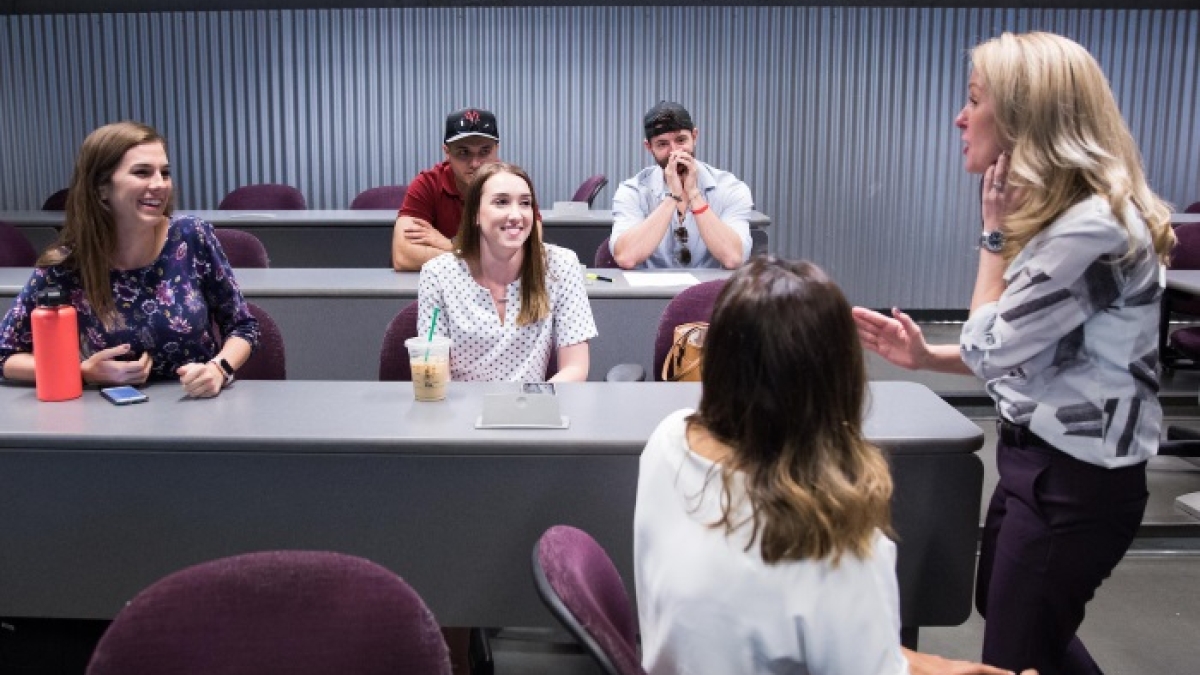Effective teaching course a game changer for College of Health Solutions faculty

Teachers learn techniques to increase student engagement as part of the online course in effective teaching practice from the Association College and University Educators.
Smartphones, apps, social media and other technology innovations have forever changed our lives, and that includes higher education.
The current university learning environment is vastly different from even a few years ago. Today’s students expect their classroom experience to be as fast-paced, personal and responsive as the electronic devices they use, challenging faculty to revisit teaching methods and work to continually improve their courses in order to keep their students’ attention.
To that end, five faculty members at the College of Health Solutions recently completed the inaugural online Course in Effective Teaching Practice through the Association of College and University Educators (ACUE), a pilot teaching improvement program ASU joined earlier this year.
Colleen Cordes, assistant dean and clinical professor in the Doctor of Behavioral Health program, was in the group and was impressed by the course.
“It absolutely changed the ways I think about teaching,” Cordes said.
Cordes completed the rigorous 28-module course, earning ACUE’s Certificate in Effective Teaching Practices, along with Sue Dahl Popolizio, also a clinical professor of behavioral health, Sarah Martinelli and Simon Holzapfel, clinical assistant professors of nutrition, and Adela Grando, assistant professor of biomedical informatics. While they reported dedicating a fair amount of time to the course, all said it was a transformational experience.
“It’s the best job training out there,” Holzapfel said.
Learn
Each lesson consisted of a video that demonstrated a research-based, active learning technique. After watching the video, faculty implemented the practice in their classrooms and then reflected on the experience, both in writing and with colleagues via online discussion boards. Faculty estimated they spent between three and eight hours a week per module.
Implement
For all, the best part of the course was seeing how their classrooms changed when they used some of activities.
“Students really reacted well to concepts like breaking class up into smaller pieces with active work or teamwork dispersed between lecture,” Martinelli said. “I also now make an effort to engage more students and add things like skeletal notes and end-of-class feedback.”
“I’m lecturing much less and incorporating group discussions more,” Popolizio said, adding that the course has given her many more ways to deliver content. “I used to lecture from a PowerPoint, and I would see some of the students struggling to stay awake, even if they were interested in the material. I understood why this was happening, but I didn’t know what to do differently.”
Reflect
Reflecting on each activity and being able to discuss it with fellow teachers who were also going through the program was equally valuable, Grando said.
“I liked that we could see each other’s assignments. I enjoyed hearing how my colleagues applied the techniques and we discussed what went well, what did not go well and what could have been improved.”
Improve
In addition to increasing student engagement and expanding their teaching repertoire, the certificate reflects a commitment to professional excellence. As the new assistant dean of nontenure-eligible faculty, Cordes said she wants to model the importance of continued professional improvement.
“It’s too easy to keep doing what we’re doing when teaching, particularly if we’re accustomed to good teaching evaluations.”
All were very positive about the learning gained from the program and agree that this type of professional development is a resume builder.
“I’m immensely proud of receiving this certificate because it’s evidence of job qualification,” Holzapfel said. “If I were on a committee to hire faculty, I would look for ACUE certification.”
More Health and medicine

What makes human culture unique?
Why is human culture — the shared body of knowledge passed down across generations — so much more powerful than animal cultures?“…

ASU honors students work on HPV research as part of Barrett College's largest-ever group thesis
Not every undergraduate student comes across the opportunity to do research as part of a team. Even fewer have had the chance to…

College of Health Solutions alumnus named Military Medic of the Year
By Keri Hensley and Kimberly LinnJonathan Lu has looked out for the health of his fellow military service members his whole…